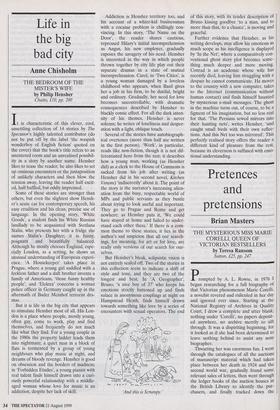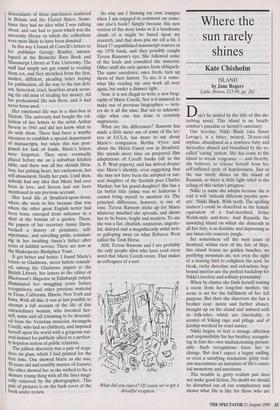Pretences and pretensions
Brian Masters
THE MYSTERIOUS MISS MARIE CORELLI, QUEEN OF VICTORIAN BESTSELLERS by Teresa Ransom Sutton, £25, pp. 247 Prompted by A. L. Rowse, in 1976 I began researching for a full biography of that Victorian phenomenon Marie Corelli, a novelist revered and ridiculed in her day and ignored ever since. Starting at the National Registry of Archives in Quality Court, I drew a complete and utter blank; nothing under 'Corelli', no papers deposit- ed anywhere, no archive merrily to sift through. It was a dispiriting beginning, for it looked as if she had been determined to leave nothing behind to assist any nosy biographer.
Thwarting her was enormous fun. I went through the catalogues of all the auctions of manuscript material which had taken place between her death in 1924 and the second world war, gradually found some relevant sales of letters, then went through the ledger books of the auction houses in the British Library to identify the pur- chasers, and finally tracked down the descendants of those purchasers scattered in Britain and the United States. Some- times they had no idea what I was talking about, and one had to guess which was the university library to which the collections were most likely to have been donated.
In this way I found all Correlli's letters to her publisher George Bentley, uncata- logued at the Beinecke Rare Book and Manuscript Library at Yale University. The staff had simply not got round to reading them yet, and they stretched from the first, modest, diffident, pleading letter hoping for publication, all the way to the last defi- ant, hysterical, cruel, heartless attack accus- ing the old man of stealing her money. All her professional life was there, and it had never been used.
Her emotional life was in a shoe-box in Detroit. The university had bought the col- lection of her letters to the artist Arthur Severn in 1945 and did not know what to do with them. There had been a worthy intention to establish a special department of manuscripts, but when this was post- poned for lack of funds, Marie's letters were forgotten. They were eventually placed before me on a suburban kitchen table, and there was all her skittish flirta- tion, her pulsing heart, her excitement, her self-abasement, finally her pain. Until then, nobody had any idea that Marie had ever been in love, and Severn had not been mentioned in any previous account.
Her local life at Stratford-upon-Avon, where she went to live because that was where the other great English writer had been born, emerged from suitcases in a shed at the bottom of a garden. These, the papers of her secretary Annie Davis, tracked a history of petulance, self- mportance, and snivelling pride, terminat- ing in her insulting Annie's father after years of faithful service. These are now at the Shakespeare Birthplace Trust. It got better and better. I found Marie's letters to Gladstone, never before consult- ed, among the Gladstone papers at the British Library, her letters to the editor of Blackwood's Magazine in Edinburgh (which illuminated her struggling years before recognition), and other precious material in Texas, California, Illinois, New York and Iowa. With all this, it was at last possible to attempt a full account of the life of this extraordinary woman, who invented her- self, name and all (claiming to be descend- ed from the Venetian musician Arcangelo Corelli, who had no children), and imposed herself upon the world with a gorgeous nat- ural instinct for publicity allied to a perfect- ly hopeless notion of public relations.
The jolliest discovery was a pair of nega- tives on glass, which I had printed for the first time. One showed Marie as she was, 50 years old and sensibly mature of feature; the other showed her as she wished to be, a demure young thing with all the lines magi- cally removed by the photographer. This pair of pictures is on the back cover of the book under review. So why am I blowing my own trumpet when I am engaged to comment on some- one else's book? Simply because this new version of the story looks as if a handsome chunk of it might be based upon my research, and that does piss me off a bit. I listed 17 unpublished manuscript sources in my 1978 book, and they possibly caught Teresa Ransom's eye. She followed some of the leads and consulted the material. Other stuff she only quotes from obliquely. The same anecdotes, once fresh, turn up shorn of their history. To me, it is some- what like reading my own work all over again, but under a dimmer light. Now, it is not illegal to write a new biog- raphy of Marie Corelli. Nor is it immoral to make use of previous biographies — writ- ers do it all the time. But not to acknowl- edge what one has done is certainly ungracious.
What are the differences? Ransom has made a little more use of some of the let- ters at UCLA, has more to say about Marie's companion Bertha Vyver and about the Helen Faucit row in Stratford. She spends more time on projected film adaptations of Corelli books (all in the A. P. Watt papers), and has delved deeper into Marie's identity, even suggesting that she may not have been the adopted or nat- ural daughter of the Scottish poet Charles Mackay, but his grand-daughter! She has a far better title (mine was so ludicrous I cannot bring myself to mention it). The principal difference, however, is one of tone. Teresa Ransom sticks up for Marie whatever mischief she spreads, and shows her to be brave, bright and modern. To me she was a liar, churlish, suspicious, ungrate- ful, disloyal and a magnificently awful writ- er galloping away on what Rebecca West called the Tosh Horse.
Still, Teresa Ransom and I are probably the only people alive who have read every word that Marie Corelli wrote. That makes us colleagues of a sort.
`What did you expect? Of course we've got a dreadful reception.'



























































 Previous page
Previous page